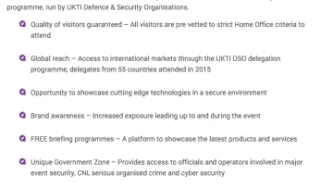Search
Content type: Video
**Language advisory: Gus does several swearwords this episode including one f-word at 9:45
From surveillance drones to cameras to wiretapping and more - the EU are providing technologies that will be used to crush political and civil freedoms and undermine democracy without urgent reforms
Find out more:
https://privacyinternational.org/long-read/4288/borders-without-borders-how-eu-exporting-surveillance-bid-outsource-its-border
https://privacyinternational.org/…
Content type: Press release
Today, the ICO has issued a long-awaited and critical report on Police practices regarding extraction of data from people's phones, including phones belonging to the victims of crime.
The report highlights numerous risks and failures by the police in terms of data protection and privacy rights. The report comes as a result of PI’s complaint, dating back to 2018, where we outlined our concerns about this intrusive practice, which involves extraction of data from devices of victims, witnesses…
Content type: Long Read
There are few places in the world where an individual is as vulnerable as at the border of a foreign country.
As migration continues to be high on the social and political agenda, Western countries are increasingly adopting an approach that criminalises people at the border. Asylum seekers are often targeted with intrusive surveillance technologies and afforded only limited rights (including in relation to data protection), often having the effect of being treated as “guilty until proven…
Content type: News & Analysis
Today Advocate General (AG) Campos Sánchez-Bordona of the Court of Justice of the European Union (CJEU), issued his opinions (C-623/17, C-511/18 and C-512/18 and C-520/18) on how he believes the Court should rule on vital questions relating to the conditions under which security and intelligence agencies in the UK, France and Belgium could have access to communications data retained by telecommunications providers.
The AG addressed two major questions:
(1) When states seek to impose…
Content type: News & Analysis
Photo: The European Union
On 2 September 2019, Privacy International, together with 60 other organisations, signed an open letter to the European Parliament to express our deep concern about upcoming EU policy proposals which undermine the EU’s founding values of human rights, peace and disarmament.
Since 2017, the EU has diverted funds towards security research and security capacity-building in countries around the world. The proposal for the EU's next budget (2021-2027) will…
Content type: Long Read
It is common ground that bulk collection of content would be a deprivation of the right to privacy. That is an inexcusable or unjustifiable step too far. Repeatedly the Government whether in litigation or legislating, has emphasised that they are not taking content in bulk. Content is the forbidden ground.
This has resulted in the Government seeking to explain, for example, what parts of an email would constitute content and meta data. Within the Investigatory Powers Act it has led to the…
Content type: Long Read
Six years after NSA contractor Edward Snowden leaked documents providing details about how states' mass surveillance programmes function, two states – the UK and South Africa – publicly admit using bulk interception capabilities.
Both governments have been conducting bulk interception of internet traffic by tapping undersea fibre optic cables landing in the UK and South Africa respectively in secret for years.
Both admissions came during and as a result of legal proceedings brought by…
Content type: News & Analysis
Privacy International has joined a global coalition of privacy campaigners, tech companies, and technology experts to respond to proposals by British intelligence chiefs aimed at allowing them access to encrypted messaging apps such as WhatsApp or Signal.
If implemented, the proposals would allow government authorities to force messaging platforms to silently add a law enforcement participant to a group chat or call.
Such a capability poses serious threats to…
Content type: Long Read
Imagine that every time you want to attend a march, religious event, political meeting, protest, or public rally, you must share deeply personal information with police and intelligence agencies, even when they have no reason to suspect you of wrongdoing.
First, you need to go to the police to register; have your photo taken for a biometric database; share the contacts of your family, friends, and colleagues; disclose your finances, health records, lifestyle choices, relationship status, and…
Content type: Long Read
The Privacy International Network is celebrating Data Privacy Week, where we’ll be talking about how trends in surveillance and data exploitation are increasingly affecting our right to privacy. Join the conversation on Twitter using #dataprivacyweek.
Innovations in surveillance and data exploitation present challenges in the fight to protect personal data across the world. Since 1990 we have been working to build a global movement through working with others - from leading civil society…
Content type: News & Analysis
European leaders met last week in Brussels to discuss what is supposed to be two separate issues, the next trillion euro-plus budget and migration. In truth, no such separation exists: driven by nationalists and a political mainstream unable to offer any alternative but to implement their ideas, the next budget is in fact all about migration.
This strategy contained within the budget will get the approval of Hilary Clinton, who recently told the Guardian that ‘Europe needs to get a handle on…
Content type: Long Read
Creative Commons Photo Credit: Source
UPDATE: 30 July 2019
Privacy International has identified the following:
Two RAB officers received approval to travel to the USA in April 2019 for training on “Location Based Social Network Monitoring System Software for RAB Intelligence Wing”
Three RAB officers received approval to travel to Russia in August 2017 to participate in user training of “Backpack IMSI Catcher (2G, 3G, 4G)” paid for by Annex SW Engineering, a…
Content type: Press release
We found this picture here.
Privacy International has today a issued a formal complaint to the UK Information Commissioner about the police’s use of intrusive ‘mobile phone extraction’ technology, enabling them to download all of the content from a person’s phone — without a warrant, and whether they are suspect, witness or even victim of a crime. Further complaints have also been sent to the Home Office and the Independent Office for Police Conduct, calling for urgent reforms to a totally…
Content type: Long Read
Image: Eric Jones
The UK government last week hosted hundreds of surveillance companies as it continues to try and identify “technology-based solutions” able to reconcile the need for controls at the Irish border with the need to avoid them.
The annual showcase conference of 'Security and Policing' brings together some of the most advanced security equipment with government agencies from around the world. It is off limits to the public and media.
This year’s event came as EU and UK…
Content type: News & Analysis
On Friday, we wrote to 140 companies around the world that are known to be selling surveillance technology, to ask them a series of questions. We wanted to know whether or not companies conducted human rights due diligence when dealing with foreign companies or governments, how many of them were doing business or seeking to do business with 'Not Free' countries (as categorised by Freedom House's latest report), and whether any of them would be interested in meeting with us to discuss their…
Content type: News & Analysis
Privacy International welcomes reports that the French Government has come out against the export of surveillance technology to oppressive regimes. According to the French website reflets.info, the State Secretary for the Digital Economy Fleur Pellerin announced her opposition to such exports last Friday, during a radio show hosted by Le Monde and public broadcaster FranceCulture. The statement may indicate a sea change in the government's policies regarding surveillance technology, which have…
Content type: Press release
Privacy International today received an email from Saul Olivares, Sales and Marketing Director of Creativity Software, in response to the letter we sent to Creativity CEO Richard Lee yesterday.
Mr Olivares directed PI to an attached statement, in which Creativity stated that it was:
…proud to be a supplier of world class technology to MTN, in Iran and other countries. MTN is a company with the vision of being the leading telecommunications provider in emerging markets, with an avowed mission…
Content type: Long Read
“FISA section 702 reauthorisation” might not sound like it matters very much to very many people, but it’s pretty dramatic: in short, last month US lawmakers rejected a bill which would have provided protections for US citizens – constitutionally protected against being spied on by US spy agencies – from being spied on, and instead voted to extend their powers to do so.
In the fall out, it’s worth considering just why such mass surveillance powers are such a big issue, how the promise of…
Content type: Long Read
Privacy International is celebrating Data Privacy Week, where we’ll be talking about privacy and issues related to control, data protection, surveillance and identity. Join the conversation on Twitter using #dataprivacyweek.
Exercising the right to privacy extends to the ability of accessing and controlling our data and information, the way it is being handled, by whom, and for what purpose. This right is particularly important when it comes to control of how States perform these activities.…
Content type: News & Analysis
17 June 2013
Below is an excerpt of an article that recently appeared in Melbourne, Australia's The Age, written by Carly Nyst, Head of International Advocacy at Privacy International:
"Mass surveillance of a country's citizens by its government can no longer be said to be the preserve of authoritarian and dictatorial states.
The publication last week by The Guardian of classified National Security Agency documents has exposed the extent of surveillance by the US government, throwing…
Content type: News & Analysis
The following op-ed appeared in openDemocracy, written by Edin Omanovic, Research Officer at Privacy International:
It's not surprising that some of the states in Central Asia spy on people. Authoritarianism across the world relies on the intrusion into, and lack thereof, of a private sphere. From the KGB to their modern incarnations, the autocracies in the region continue to rely on state surveillance and other entrenched means of political control to stay in power.
New technologies and…
Content type: News & Analysis
The following appeared in the Daily Telegraph, and was written by Carly Nyst, Legal Director of Privacy International:
"Robert Hannigan, the new head of GCHQ, announced his arrival this week with a call for “greater co-operation” with security forces by tech companies. Hannigan’s article in the Financial Times illustrated vividly the destructive ideology that has driven the infiltration by the British and American intelligence agencies into every aspects of the digital realm – an…
Content type: Press release
The release of a new report by Privacy International exposes Colombia's intelligence agencies' previously unknown history of developing communications surveillance capabilities outside of lawful authority.
The report “Shadow State: Surveillance law and order in Colombia” reveals, via previously unreleased documents, the Colombian police agencies' and intelligence services' long history developing surveillance systems. Rather than building a well-regulated system of surveillance after Colombia…
Content type: Press release
PI Research Officer Edin Omanovic said:
“The European Commission has proposed sweeping updates [PDF] to trade regulations in an effort to modernise the EU’s export control system and to ensure that the trade in surveillance technology does not facilitate human rights abuses or internal repression.
Privacy International welcomes the intentions of the proposed changes in terms of protecting human rights as it does all such moves. More than half of the world’s surveillance…
Content type: News & Analysis
Privacy International is today proud to release the Surveillance Industry Index (SII), the world's largest publicly available educational resource of data and documents of its kind on the surveillance industry, and an accompanying report charting the growth of the industry and its current reach.
The SII, which is based on data collected by journalists, activists, and researchers across the world is the product of months of collaboration between Transparency Toolkit and Privacy…
Content type: Long Read
“This is my personal opinion,” concedes Branko, a taxi driver in Skopje, the Republic of Macedonia's capital. “It was done by America to stop Putin building his gas pipe line through Macedonia.”
“This is just politics,” he advises, skeptically.
It's a common reaction to the wiretapping scandal in Macedonia. Beginning in February last year when opposition leader Zoran Zaev posted a series of wiretaps online that he called 'bombs' – they seemingly showed that for years the phone calls of some…
Content type: News & Analysis
Surveillance companies and government officials from across the world are gathering in the UK this week at the invitation of the Home Office for the UK’s “Premier Security and Law Enforcement Event’, one week after the controversial spying legislation, entitled the Investigatory Powers Bill, had its first reading in Parliament.
Delegates and companies will be attending the three-day long ‘Security and Policing’ trade show in Farnborough, the historical centre of the UK’s aerospace industry.…
Content type: News & Analysis
Today, Privacy International is publishing the result of a global effort to benchmark surveillance policies and practices in the countries that are part of the Privacy International Network. We're calling it the 'State of Surveillance'.
We designed a survey of questions based on some key issues: statistics about the communications infrastructure of the country; what civil society organisations and groups that analyse privacy issues; the international and domestic legal framework…
Content type: Press release
Privacy International today publishes a new investigation, based on exclusive documents, exposing the sale of European surveillance technologies to a secret unit of Egypt's intelligence infrastructure.
The Technical Research Department (TRD) is an independent unit within the General Intelligence Service (GIS), accountable only to the President. According to sources, the TRD has the biggest budget for surveillance technologies of any Egyptian government body. Such large public expenditure…
Content type: News & Analysis
In an enormous breakthrough for those seeking transparency and accountability to the shadowy surveillance industry, the Swiss Government has been forced to publish the list of export licenses for surveillance technologies and other equipment, including details of their cost and destination.
The decision by the Federal Information and Data Protection Commissioner comes on the heels of consistent pressure from Privacy International, Swiss journalists, and several Members of Parliament on…
























